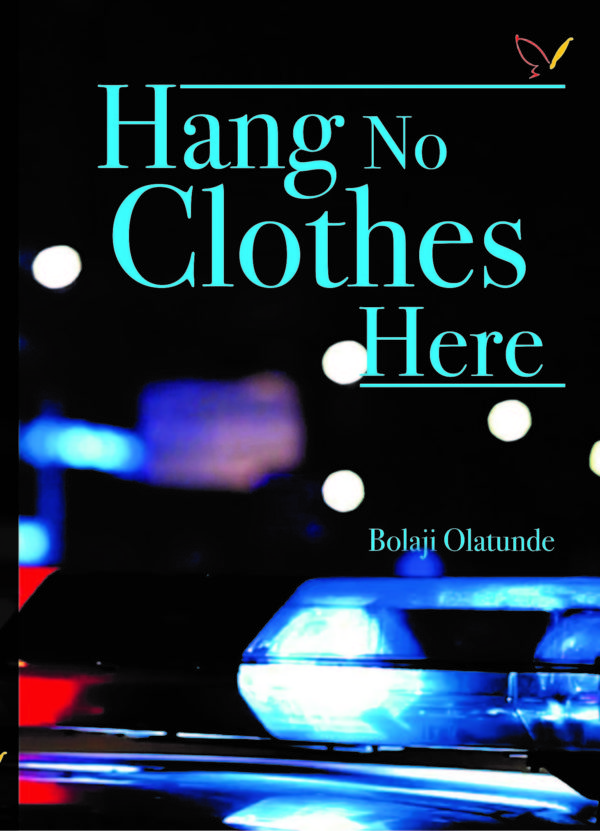
Hang No Clothes Here, Bolaji Olatunde’s second novel, is out this month from Parresia/Origami Publishers. Set in 2011, it follows a policeman who gets involved in an international struggle between two major drug cartels fighting for the control of the Nigerian route to European and Asian narcotics markets. Here is an excerpt.
*
Chapter Sixteen
The first few minutes of our drive back to the National Assembly was spent in silence. I watched my friend, Dennis, carefully. He kept glancing in the rear-view mirror more than was necessary.
To break the silence, I began talking about my Infusion adventure and the lady who had invited me.
“Why didn’t you introduce me to the chick now?” Dennis asked.
“Weytin you for do with am?”
“Ehen! Now, I know you have plans! If Mrs Braimoh catch you, ya own don’ finish be that!”
“I don’t have plans. She’s just a colleague, and not a full one sef. Na half colleague.”
“Half colleague? If I hear! I pray! Just be careful. Anyway, she didn’t catch you before, so she—” He cleared his throat suggestively. I shifted in my seat uncomfortably. “May God destroy all your unholy plans for this girl. Say amen!”
I smiled.
“You see! I said it! You have bad plans, you this man!”
I shook my head with mock annoyance.
“You no get work o. You be real jobless man! You went to an event for the rich—the elite and their children and told them that they’re cowards for going abroad to search for a better life for themselves. Do you think that one will change anything?” He shook his head derisively, a little smile dancing on his face.
“Someone had to say it,” I said. “Besides, I was in an angry mood.”
“Mr John Braimoh, you’re always in an angry mood. Yes, they’re going to Europe and America for education, healthcare. Even India, Malaysia and Dubai these days. Better forget that girl. Nothing carnal will come out of it.”
“The money they’re spending abroad in hospitals can improve things here.”
“If their people, and them, don’t steal it. See you! Na medical tourism dey pain you? Their children no longer marry home-based poor people like us. It’s now white people! Why should they come and marry one black ugly musheshe Nigerian like you and me? What rubbish! Me and my white man, or white woman, that’s the way it is now. Not just any white man o, someone who has money. But a poor white man has a better chance of marrying their children sha than you and me!”
“Hmm!” I drew in a sharp breath.
“Have you heard of what they call pigmentocracy?”
“No. Weytin be that one again?”
“When a society gives greater importance to certain races, especially white people. That’s what our people practice and believe in.”
“Why do you say that?”
“Have you ever heard of our rich people’s children marrying poor white people? Okay, some stupid Nigerians may do that. I remember one yeye guy in my class in university who used to say white people are always finer than blacks, so that kind of person can do that, but a girl from a rich home won’t do it. Imagine! He would say the ugliest white person is finer than the finest black person, and this guy was the epitome of ugly! Whether rich or poor white person, our people will always marry white people as trophy spouses—to tell fellow Nigerians: see me o, my people, me and my whitey! It doesn’t matter that we Nigerian men have the longest and best pricks, that one no concern them. The pride of having a white partner is more important than anything else.”
I watched him handle the steering wheel with his left hand while he stabbed the air with his right hand.
“So you agree with me?” I asked.
“Of course, in principle. But if we were in their shoes, we would probably do the same or worse. Look at our yeye celebrities. All those stupid actresses in Nollywood. I saw somewhere where one of those actresses that Lydia admires—I can’t remember her name now—said she can’t marry a Nigerian, only a white man, because they’re more romantic than Nigerian men. That’s one reason why I like Omotola Jalade! Omosexy herself! She married a Nigerian, like herself, like you and me, and that is enough for me to like her, although I won’t mind having her for just one night. That woman sexy true, true—that kain woman sabi how to keep man busy so that the man will not have need to be looking outside. One gullible girl will read that nonsense said by that yeye actress who’s not as fine or as talented as Omotola and will also start aiming for a white husband. If I handle that actress for just two hours, she will change her orientation sharp-sharp!”
I laughed long and hard.
“You and two hours! I don’t think she meant only sex, you know, dinners, chocolate, buying flowers, you know, that kain thing,” I said when I had recovered my breath.
“Me, I be African man! Weytin concern me with flower? I have no business with flowers. I’m not a goat ke! Na goat dey eat flower. I can buy other things but what’s my business with flower? That’s what we’re talking about. Our senses are dead, our culture is dead—we’re all virtually walking dead. In those rich people’s warped mentality, there’s a pecking order in marriage. At the bottom rung of exotic spouses for those rich idiots is the rich African from outside Nigeria, next up is the black American—God help him if he’s poor. Then further up the chain, we have the Chinkos from China, then Arabs from Saudi or Egypt, and then the ultimate trophy husband: a pure-breed whitey from Europe, Canada, USA. I have associated with those people, so I know what I’m saying. Go to shopping plazas like Park N’ Shop, Ceddi Plaza, and you’ll see them there, talking with their fake-fake accents and showing their whitey lovers and spouses around to the world, to tell their Naija brothers and sisters how they’re now better than them.” He paused to regain his breath.
“Are you saying there can’t be true love in their relationships?” I asked.
“Very minimal. I know that, you know it, they know it, and they know that we know that they know. Everybody is going abroad for everything, good people, bad people, dull and intelligent. Have you read The Trouble with Nigeria by Chinua Achebe?”
We came to the traffic light at the cross junction that linked Muhammadu Buhari way with Ahmadu Bello way. The red light came on and Dennis obeyed it.
“No, I’ve not read it.”
“Go and read it. Our journalists will always quote where Achebe says the problem of Nigeria is that of leadership, but nobody will quote where he said he doesn’t think he has the right to look for a more comfortable part of the world which another person’s intelligence and labour have built.”
“Hmm.”
“But after he recovered from the accident that made him to start using wheelchair, he stayed back in America. Instead of remaining to teach our youths here and developing them, he stayed back. Nobody will accuse him of betrayal or hypocrisy because he is untouchable, he’s a legend.”
“You’re saying something,” I said, nodding involuntarily.
“The man has been abroad since the early 1990s, teaching. Do you think there is any university in Nigeria that will reject Achebe as a professor?”
“Well, I don’t know—”
“None! They never born that VC in Nsukka who will say, ‘Sorry, Professor Achebe, you can’t teach in this university, because you’re of retirement age.’ People like him built that school.”
“With a wheelchair, life can be hard o, in this our Naija.”
He hissed. “Nonsense. Come and see some of the handicapped students when I was in UNILAG. They used crutches and wheelchairs and they lived student lives like the rest of us. Some were even the best in their class. It’s a black man thing. In racist America of the 1950s and ‘60s, black intellectuals were running away from America to Europe—writers, professors, saying they could not live with racism. Why? Because the average black man intellectual is, at heart, a coward! He won’t fight, but he will shout inflammatory words from the comfort of a haven.”
“That’s harsh!”
“It’s not. It’s the poor people who Martin Luther King mobilised that marched and fought. Go and read the history books well. Help will never come from the intellectual class. They like comfort. They’ll always go to where there is bread and butter.”
“In UI, there was a guy who used to crawl around with slippers on his hands, climbing stairs and struggling to enter classes with others. He was studying engineering, I think, and he was one of the best, I heard.”
“Oh-ho! Anybody can make it here if they’re determined. Don’t begrudge these abroad akata diaspora people. It’s all about the money and glory. They are all economic migrants, whether street sweeper or professor. If US economy collapse completely today and Naija own shoot up, you think they will remain there? Where will they notice you more or pay you better? Is it when you’re lecturing in Harvard or one backyard school like LAUTECH or LASU?”
The light showed green and we moved on, turning left and going down Ahmadu Bello Way.
I sighed.
“Even the whites your akata writer friend is badmouthing truly love our poor people more than us black Africans. Is it a small thing for a white person to come all the way from US and UK to come and be doing charity work in villages in Africa, for peanuts?” I shook my head. “But our writer friend who loves Africa so much is living and working in the US and grooving life. If he loves Africa so much, why is he not living here in Africa? If Nigeria’s problem too hot, why not South Africa, Ghana or Botswana or other African countries where there is more peace or even better development? Must they be in the West? Nonsense!”
He dropped me off inside the National Assembly compound. Our uniforms made entry easy—ordinary civilians wouldn’t be able to drive in just like that.
“Let’s keep in touch,” he said as I alighted from the car. “I really appreciate your advice, and your time.”
“It’s okay,” I said.
I watched him drive off in the direction of the gates before I entered the huge edifice that is the National Assembly.
About the Author:
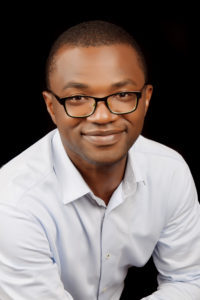 Bolaji Olatunde’s Hang No Clothes Here is his second novel. His first novel, Straw Dogs, was published in 2011. He also writes plays and short stories which have been favourably received. His play, Sacking the Potter, was shortlisted for the Association of Nigerian Authors (ANA) Drama Prize 2016. He currently lives and works in Abuja, Nigeria. Twitter: @BOLMOJOLA. Facebook: Bolaji Olatunde (Author).
Bolaji Olatunde’s Hang No Clothes Here is his second novel. His first novel, Straw Dogs, was published in 2011. He also writes plays and short stories which have been favourably received. His play, Sacking the Potter, was shortlisted for the Association of Nigerian Authors (ANA) Drama Prize 2016. He currently lives and works in Abuja, Nigeria. Twitter: @BOLMOJOLA. Facebook: Bolaji Olatunde (Author).



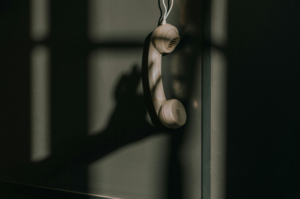

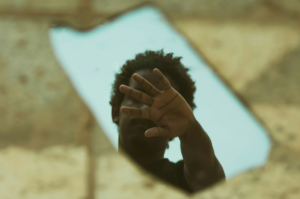

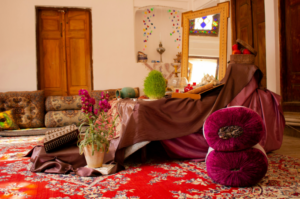

COMMENTS -
Reader Interactions